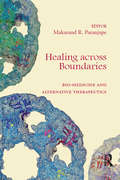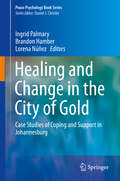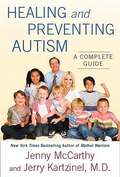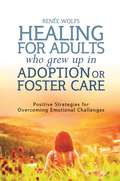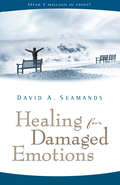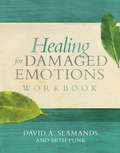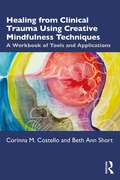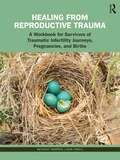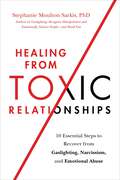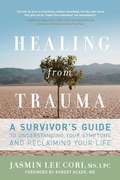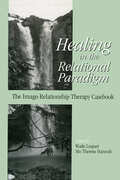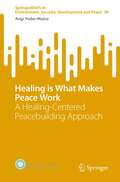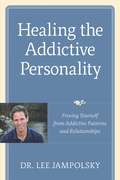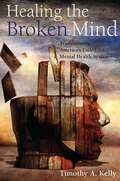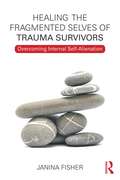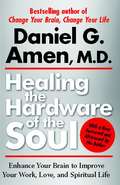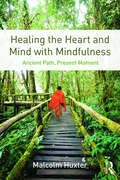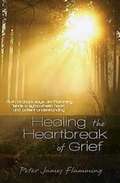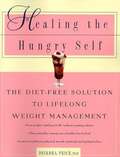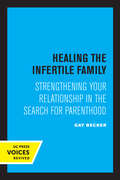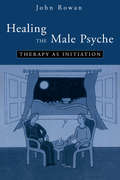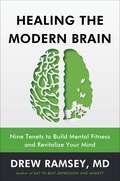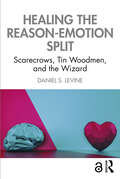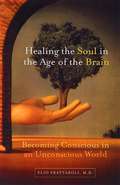- Table View
- List View
Healing across Boundaries: Bio-medicine and Alternative Therapeutics
by Makarand R. ParanjapeThis unique volume initiates a dialogue between bio-medicine and alternative therapeutics. Undertaking a multidisciplinary exploration of the science and spirituality of healing and wellness, it offers varied perspectives from doctors, medical researchers, Ayurvedic practitioners, philosophers, psychologists, sociologists, and cultural critics. It expands the horizons of health sciences in engaging with diverse traditions — bio-medicine, Ayurveda, Siddha, and Jaina bio-ethics. The book will interest scholars and researchers in social and community medicine, biological sciences, sociology and social anthropology, as well as cultural studies.
Healing and Change in the City of Gold
by Brandon Hamber Ingrid Palmary Lorena NúñezThis volume collects case studies on the lives of people living in post-apartheid Johannesburg, South Africa. In doing so, it considers how people manage, respond to, narrate and/or silence their experiences of past and present violence, multiple insecurities and precarity in contexts where these experiences take on an everyday continuous character. Taking seriously how context shapes the meaning of violence, the forms of response, and the consequences thereof, the contributing chapter authors use participatory and ethnographic techniques to understand people's everyday responses to the violence and insecurity they face in contemporary Johannesburg. Each case study documents an example of a strategy of coping and healing and reflects on how this strategy shapes the theory and practice of violence prevention and response. The case studies cover a diversity of groups of people in Johannesburg including migrants, refugees, homeless people, sex workers and former soldiers from across the African continent. Read together, the case studies give us new insights into what it means for these residents to seek support, to cope and to heal challenging the boundaries of what psychologists traditionally consider support mechanisms or interventions for those in distress. They develop a notion of healing that sees it as a process and an outcome that is rooted in the world-view of those who live in the city. Alongside the people's sense of insecurity is an equally strong sense of optimism, care and a striving for change. It is perhaps not surprising, then, that this book deals very centrally with themes of the struggle for progress, mobility (geographic, material and spiritual), and a sense of possibility and change associated with Johannesburg. Ultimately, the volume argues that coping and healing is both a collective and individual achievement as well as an economic, psychological and material phenomenon. Overall this volume challenges the notion that people can and should seek support primarily from professional, medicalized psychological services and rather demonstrates how the particular support needed is shaped by an understanding of the cause of precarity.
Healing and Preventing Autism
by Jenny Mccarthy Jerry KartzinelJenny McCarthy-whose bestselling books Louder Than Words and Mother Warriors told the stories of healing children with autism-teams up with a preeminent autism doctor to write the first book on a remarkably effective treatment. In 2006, autism became the leading disorder affecting children in the United States. While diagnoses skyrocket and parents struggle to find help, a group of innovative doctors has been pioneering therapies and treatments that are remarkably effective in healing conditions associated with autism. As word spreads about these incredible discoveries- helped in part by Jenny McCarthy's book Louder Than Words- parents are desperate to learn about the biomedical therapies for themselves. Since early intervention is key to a successful recovery, McCarthy has teamed up with Dr. Jerry Kartzinel, the doctor who successfully treated her son, to write the first book to give parents all the necessary information about biomedical treatment. Beginning with diagnosis, Dr. Kartzinel explains the different therapies that he uses. He shows parents how to make simple changes to their child's environment and diet that can result in marked improvements and are safe and easy to try at home. And finally he explains some of the more advanced therapies that many doctors use today, and the way parents, alongside a qualified medical professional, can determine whether or not such treatments would benefit their child. For new parents, Dr. Kartzinel provides helpful guidelines on how to best protect their child from developing autism.
Healing for Adults Who Grew Up in Adoption or Foster Care: Positive Strategies for Overcoming Emotional Challenges
by Marlene Van Steensel Kate Eaton Renee WolfsPositive and practical, this guide is designed to offer a route to recovery from grief and loss after adoption or long-term foster care. Children growing up in adoptive families or foster care often have complicated feelings about the loss of their birth parents - feelings which become all the more complex as they gain independence and become young adults, and which can endure throughout their lives. Common life events such as entering new relationships, building a family or losing a loved one can give rise to difficult questions about their own childhood and identity. In this book, Renée Wolfs provides an accessible explanation of the feelings of loss and grief commonly experienced by adults who grew up in adoptive families or foster care, and how debilitating they can be. She provides grounded advice and strategies to aid recovery and provides the reader with a useful tool: The Circle of Connecting. The Circle provides strategies for healing from loss, spanning all seven elements of your life: your body, mind, heart, environment, past, present and future. This book is essential reading for older teens and adults who need help in addressing feelings of grief and loss, as well as those who support them including adoptive and foster parents, social workers, counsellors and therapists.
Healing for Damaged Emotions
by David A. SeamandsEvents in our lives, both good and bad, form rings in us like the rings in a tree. Each ring records memories that affect our feelings, our relationships, and our thoughts about God. In this classic work, David Seamands encourages us to live compassionately with ourselves as we allow the Holy Spirit to heal our past. As he helps us name hurdles in our lives--such as guilt, poor self-worth, and perfectionism--he shows us how we can find freedom from our pain and enjoy the abundant life God wants for us.
Healing for Damaged Emotions Workbook
by David A. SeamandsEvery experience we have forms a ring of memory in us. Each ring affects our feelings, our relationships, and our understanding of God. But those memories don't have to control us. In this workbook edition of the beloved classic Healing for Damaged Emotions, David Seamands helps you move beyond the perfectionism, poor self-esteem, and shame that comes from unresolved pain. Here you'll find: * The entire text of Healing for Damaged Emotions * Suggestions for Scripture reflection * Prayer exercises and journaling prompts * Discussion questions and a guide to group study Through Seamands's encouraging and practical words, you'll discover that your past doesn't have to hurt your present.
Healing from Clinical Trauma Using Creative Mindfulness Techniques: A Workbook of Tools and Applications
by Corinna M. Costello Beth Ann ShortThis workbook offers diverse strengths-based tools to incorporate the Creative Mindfulness Technique (CMT) into clinical practice. It provides an essential understanding of the ethical scope of practice, ensuring that clinicians consider the depth of their own training in the implementation of the CMT art directives. Chapters explore aspects such as attachment and art therapy, multicultural considerations when using art with clients, mindfulness, the eight dimensions of wellness, and the application of CMT techniques with clients affected by PTSD, anxiety, and low self-esteem. The creative activities, mindfulness approaches, and arts-based exercises provided support the healing process of clients in ways that are accessible, practical, and easy to execute. Examples of activities include guided imageries with art-making, art journaling directives, and mixed media prompts. Through these exercises, clients will learn to draw upon their strengths and feel empowered in their daily lives. People with PTSD/clinical trauma, stress, addiction, and anxiety, and clinicians and mental health practitioners working with them will find this book to be an essential tool.
Healing from Reproductive Trauma: A Workbook for Survivors of Traumatic Infertility Journeys, Pregnancies, and Births
by Bethany WarrenIf you have experienced trauma during your reproductive journey, from conception through your postpartum recovery, you are not alone. Pregnancy and new parenthood can be fraught with numerous potential distressing situations, such as infertility, pregnancy and postpartum complications, pregnancy losses, and childbirth. It’s no wonder that 1 out of 3 parents report their birth experiences were traumatic, and upwards of 40% of new parents can experience PTSD during the perinatal period. Perhaps it was what happened to you that was distressing, and maybe it was how you were treated that created or added to the distress. This can be a difficult time to navigate, particularly if you feel scared, overwhelmed by your symptoms, and isolated and alone. And yet, there is hope for healing! This workbook was written to help you build resilience and navigate difficult feelings. Drawing from empirically validated research and clinical experience, this book will help you educate yourself to further understand what you have experienced, and learn how to manage your trauma reactions. Written with sleep-deprived and traumatized parents and parents-to-be in mind, this book is divided into easy-to-read sections to help you manage your emotions and find validation and reassurance. Chapters begin by helping you identify what reproductive trauma is, what is happening "below the surface" with the brain and body’s reactive responses, and the various emotional aspects of these events. The second section focuses on building tangible skills to manage the impact of trauma, including trauma reactions and the influence on relationships and attachment with the baby. The third section provides a map of the future, instils hope around healing, highlights professional treatment options, and explores the complicated decision about future pregnancies. Whether you are preparing for trauma therapy, already working with a mental health therapist, or just starting to explore aspects of your experience, this workbook can provide support wherever you are on your healing journey. Filled with activities and gentle writing prompts, this comprehensive resource is essential for expecting or new parents who have experienced traumatic distress during this time, as well as mental health clinicians and birth providers.
Healing from Toxic Relationships: 10 Essential Steps to Recover from Gaslighting, Narcissism, and Emotional Abuse
by Stephanie Moulton SarkisFrom the psychologist and author of Gaslighting comes a practical recovery plan outlining ten foundational steps to true healing. Surviving and escaping a toxic or abusive relationship can often only be part of the struggle. Long after, survivors often struggle to heal; your self‑esteem may be damaged, you may feel rage and betrayal, and you may punish and/or blame yourself. The author of Gaslighting and specialist in toxic behavior, narcissistic abuse, and personality disorders, Dr. Stephanie Sarkis has seen it all--and she is here to help you understand how to move forward. In Healing from Toxic Relationships, Dr. Sarkis extends compassion and knowledge to survivors, helping you understand the underpinnings of toxic behavior and how to find peace. Highlighting ten essential steps, Dr. Sarkis provides survivors with an accessible framework that can be applied to anyone preparing to heal: 1. Block or Limit Contact2. Create Your Own Closure3. Forgive Yourself4. Establish Boundaries5. Talk to a Professional6. Practice Self‑Care7. Reconnect8. Grieve9. Look Outward10. Prevent: Keeping Toxic People AwayAnyone who is in a toxic relationship—whether it's with a romantic partner, colleague, family member, or friend—deserves a way out and a path forward. Dr. Sarkis offers help and hope.
Healing from Trauma: A Survivor's Guide to Understanding Your Symptoms and Reclaiming Your Life
by Jasmin CoriWhile there are many different approaches to healing trauma, few offer a wide range of perspectives and options. With innovative insight into trauma-related difficulties, Jasmin Lee Cori helps you: Understand trauma and its devastating impacts Identify symptoms of trauma (dissociation, numbing, etc. ) and common mental health problems that stem from trauma Manage traumatic reactions and memories Create a more balanced life that supports your recovery Choose appropriate interventions (therapies, self-help groups, medications and alternatives) Recognize how far you’ve come in your healing and what you need to keep growing Complete with exercises, healing stories, points to remember, and resources, this is a perfect companion for anyone seeking to reclaim their life from the devastating impacts of trauma.
Healing in the Relational Paradigm: The Imago Relationship Therapy Casebook
by Wade Luquet Mo Therese HannahFirst published in 1998. Routledge is an imprint of Taylor & Francis, an informa company.
Healing is What Makes Peace Work: A Healing-Centered Peacebuilding Approach (SpringerBriefs in Environment, Security, Development and Peace #39)
by Angi Yoder-MainaThe book goes beyond mental health and psychosocial support (MHPSS) to a holistic approach centered on healing. The book lays at the intersection of peacebuilding, global mental health, and development. In many parts of the world, entire generations live in chronic violence—just surviving. The exposure to violence has long-lasting effects which are not well accounted for in conflict analysis, stabilization efforts, peacebuilding, and governance initiatives. Extreme exposure to violence, abuse, neglect, and marginalization negatively affects levels of resilience and the ability of affecting the transition from violence to peace. A healing-centered peacebuilding approach requires fundamental changes in how systems are designed, organizations function, and practitioners engage with people, their communities, and their institutions. Key elements of the practice-based approach included inclusion, customization and contextualization, breaking cycles of violence, systems thinking, and trauma-informed tools. The approach considers emotional distress to be a critical variable in violent conflict and instability. Trauma is not only a consequence of violence, but also a cause of instability.
Healing the Addictive Personality: Freeing Yourself from Addictive Patterns and Relationships
by Lee L. JampolskySince 1991, Dr. Lee Jampolsky's self-help classic Healing the Addictive Mind has given well over 100,000 people around the world the tools to create significant change in their lives. Now he continues his proven and trustworthy blend of practical and positive psychology with HEALING THE ADDICTIVE PERSONALITY. Dr. Jampolsky's straightforward approach, based on firsthand experience, presents ways of healing addictive thinking, behavior, and destructive relationship patterns with forgiveness, compassion, and the potential for limitless opportunity through an eleven-week action plan.A personal note from the author: "Many people live in a self-imposed prison and don't even know it. I did. For years I was so busy building walls I did not see that I was imprisoning myself behind them. My addictive thinking and behavior became the bars of my cell. I denied feeling empty inside and instead looked for new things to acquire, substances to take, and goals to achieve in order to feel better about myself. Sometimes I felt momentarily free, powerful, and whole, but in the end my addictive cycle only compounded my loneliness and despair. If you recognize this pattern in yourself, this book is addressed to you. Today, I am able to tell you I now know what true freedom and happiness are and I offer the path that I intend to follow every day of my life."Reviews:"This 178 page book is a miraculous Godsend because it goes deep to expose the profile of the addictive personality, and then broadens from there to show us how to recognize the characteristics of the addictive personality and understand why it develops in the first place. The layout of this awesome teacher helped me to see how I can go from a place of addictive thinking to having a truth-based personality.I liked how the negative core beliefs were laid bare, and the healthy counterparts were readily available because many times there is denial associated with addiction and it helped me see the true man behind the curtain and not just the illusions I have been living with. The cunning foe of addiction has become such a part of our society that I would recommend this crucial and charming champion to anyone at any stage of their spiritual growth and development. This precious gem will help many on the path to serenity and it has found it's way to my spiritual toolbox. Thanks, Dr. Lee for this most excellent way out.--Riki Frahmann www.mysticlivingtoday.comFrom the Trade Paperback edition.
Healing the Broken Mind: Transforming America’s Failed Mental Health System
by Timothy A. KellyFew afflictions are as frightening or as heartbreaking as mental illness. It may be a topic that many would prefer to sweep under the rug, but it is a fact of life that we as a society can and must face. We have come a long way over the past few decades in our understanding of mental illness and its potential treatments. Yet, tragically, many across the country who struggle with serious mental illness are unable to find effective, quality medical treatment. As a federal commission on mental health concluded, the system of care is in shambles. But why? And how do we fix it?Timothy A. Kelly, former Commissioner of Virginia’s Department of Mental Health, Retardation, and Substance Abuse, brings his three decades of experience as mental health commissioner, psychology professor, and clinician to bear in confronting this crisis in America’s mental health care system. In clear and accessible terms, he exposes the weaknesses in the current system, examining how and why one of the world’s richest and most advanced countries has allowed its most vulnerable citizens to be victimized by the very system designed to help them.Armed with the latest statistics, a lifetime of experience, and heartrending life stories, Kelly argues that the patchwork of care traditionally employed to treat mental illness is simply not up to the task, and that what we need is profound, fundamental, and system-wide change. He then goes on to provide an easy-to-follow road map for achieving lasting transformation, centered on five recommendations for creating a truly effective mental health system of care that enables patients to achieve a lasting recovery.Mental illness is not going to just go away, but Kelly prescribes a comprehensive plan to make treatment accessible and effective so that those who suffer can rejoin their families and their communities. He shows how a transformed system of community-based care allows those with serious mental illness to finally be able to go home.
Healing the Fragmented Selves of Trauma Survivors: Overcoming Internal Self-Alienation
by Janina FisherHealing the Fragmented Selves of Trauma Survivors integrates a neurobiologically informed understanding of trauma, dissociation, and attachment with a practical approach to treatment, all communicated in straightforward language accessible to both client and therapist. Readers will be exposed to a model that emphasizes "resolution"—a transformation in the relationship to one’s self, replacing shame, self-loathing, and assumptions of guilt with compassionate acceptance. Its unique interventions have been adapted from a number of cutting-edge therapeutic approaches, including Sensorimotor Psychotherapy, Internal Family Systems, mindfulness-based therapies, and clinical hypnosis. Readers will close the pages of Healing the Fragmented Selves of Trauma Survivors with a solid grasp of therapeutic approaches to traumatic attachment, working with undiagnosed dissociative symptoms and disorders, integrating "right brain-to-right brain" treatment methods, and much more. Most of all, they will come away with tools for helping clients create an internal sense of safety and compassionate connection to even their most dis-owned selves.
Healing the Hardware of the Soul
by Daniel G. AmenDr. Daniel Amen's breakthrough brain-healing program has helped hundreds of thousands to overcome depression, anxiety, obsessive-compulsive disorder, and attention deficit disorder. The maverick author ofChange Your Brain, Change Your Lifeand Healing ADD now presents his proven program for repairing and strengthening our relationships, child-rearing practices, work and study routines, and, ultimately, our soulful connections, in the deepest ways possible. Guided by this book, each of us can learn to balance and optimize the parts of the brain responsible for inner growth, intimacy, and spiritual health. Drawing upon his experience with over fourteen thousand brain-imaging studies of patients from all walks of life, Dr. Amen has developed an essential tool called the Amen Brain System Checklist, a 101-question self-test used to evaluate the five brain systems that are key to achieving and maintaining a healthy brain-soul connection. The questionnaire identifies the problem brain areas readers may need to work on, offers insight into the degree to which these imbalances affect their lives, and provides targeted strategies for each area of the brain involved with spiritual issues. These are just a few of the many "brain prescriptions" to be found inHealing the Hardware of the Soul:Develop focus and improve decision-making with the One-Page Miracle for the Soul Use prayer, meditation, and diaphragmatic breathing exercises for superior emotional and spiritual flexibility Heal painful deep soul memories through thought and behavior exercises Learn how forming strong, positive new bonds actually controls impulsive behavior and stabilizes mood swingsDr. Amen's recommendations include cutting-edge advice on diet, nutritional supplements, and the judicious use of medication when needed. He also explains which medications can unbalance the brain when used improperly. Dramatic before-and-after pictures of the brain demonstrate the medical effectiveness of these clinically based healing techniques. Whether we learn the self-help strategies of cognitive reprogramming, self-hypnosis, or nutraceutical therapy, seek out psychotherapy, or rely on prescription antidepressants and antianxiety medications, Dr. Amen's sage advice and comprehensive treatment programs give us all the tools we need to optimize our work, relationships, and spiritual connections to become the people we want to be.
Healing the Heart and Mind with Mindfulness: Ancient Path, Present Moment
by Malcolm HuxterHealing the Heart and Mind with Mindfulness is a practical book that provides strategies using mindfulness to manage stress, anxiety and depression, as well as ways to cultivate psychological wellbeing. Uniquely, it combines a traditional Buddhist approach to mindfulness with contemporary psychology and current perspectives. Drawing on the author’s many years of clinical experience as a psychologist as well as his personal experience in Buddhist meditation practices, it outlines how the Buddha’s four applications of mindfulness can provide a pathway to psychological wellbeing, and how this can be used personally or with clinical populations. This accessible, user friendly book provides strategies for healing the heart and mind. Malcolm Huxter introduces mindfulness as it is presented in Buddhist psychology and guides the reader through meditations in a systematic way. The practices are clearly explained and supported by relevant real life stories. Being aware that mindfulness and meditation are simple but not easy, Huxter guides the reader from the basics of mindfulness and meditation through to the more refined aspects. He provides a variety of different exercises and guided meditations so that individuals are able to access what suits them. The guided meditations can be streamed or accessed as free audio downloads. Healing the Heart and Mind with Mindfulness is aimed at anyone who wishes to use mindfulness practices for psychological freedom. This book provides insight and clarity into the clinical and general applications of Buddhist mindfulness and will be of interest to mental health practitioners, students of mindfulness, professional mindfulness coaches and trainers, researchers and academics wishing to understand Buddhist mindfulness and the general public.
Healing the Heartbreak of Grief
by Peter James FlammingFree yourself from the threads of grief that grip your heart.In an irreversible moment, your life changes forever. Your life is upside down and your heart is inside out. Life goes on for others, but yours came to a screaming halt. With comfort and assurance, Dr. Flamming points ahead to tomorrows that will become a little easier than today. From years of pastoral experience and the heartbreak of losing his own son, the author knows that grief is anything but a tidy, predictable progression. Written in short, easy chapters, with practical helps, this book can be your companion as you struggle to pick up the pieces and go on. Contents:When Grief Breaks InWhat Do I Do Now?Unpredictable Emotions of GriefDecide Who to Talk ToWhen One Day at a Time is Too MuchFind Your Releasing ActivitesStrength from Beyond YourselfSoemtimes Faith Needs HealingTurning Points and Beginning Again
Healing the Hungry Self: The Diet-free Solution to Lifelong Weight Management
by Deirdra PriceDivided into four sections devoted to the physical, emotional, mental, and spiritual "selves," Healing the Hungry Self shows readers how shaping new behaviors leads to healthier eating while avoiding unhealthy dieting. It explains the difference between physical and emotional hunger, and how attitudes, thoughts, and feelings affect our eating choices. Dr. Price gives directions for reversing eating rituals, recognizing danger zones, using alternatives to food to cope with emotions, and accepting our bodies the way they are. This comprehensive workbook includes: Real-life stories, Checklists and questionnaires, A variety of exercises, Charts for keeping a daily routine. For those who starve themselves to lose weight, find themselves eating all day long, or turn to food for comfort or relief, Healing the Hungry Self offers a way to create a permanent change in their minds and bodies. Deirdra Price is a clinical psychologist with extensive credentials and training. Dr. Price conducts seminars nationally, speaking at high schools, colleges, hospitals, and businesses.
Healing the Infertile Family: Strengthening Your Relationship in the Search for Parenthood
by Gay BeckerUnlike most infertility books that focus on medical treatment, Healing the Infertile Family examines the social and emotional problems experienced by couples confronting infertility and suggests how they can be alleviated. In this updated edition, Gay Becker discusses her most recent study of couples experiencing infertility and offers guidelines for resolution of this common problem that will enable couples to face the future with hope. This title is part of UC Press's Voices Revived program, which commemorates University of California Press’s mission to seek out and cultivate the brightest minds and give them voice, reach, and impact. Drawing on a backlist dating to 1893, Voices Revived makes high-quality, peer-reviewed scholarship accessible once again using print-on-demand technology. This title was originally published in 1990.
Healing the Male Psyche: Therapy as Initiation
by John RowanJohn Rowan argues that if men are to escape from their old roles and the new pressures of social uncertainty they need to be initiated into a new kind of masculinity, but that this process must be personal to each man. He explores how therapy can help or hinder the process of transformation. Written for men who are looking for a new way of understanding their predicament as well as psychotherapists and counsellors working with men, Healing the Male Psyche is packed with useful information and exercises and supported by a wide range of references.
Healing the Modern Brain: Nine Tenets to Build Mental Fitness and Revitalize Your Mind
by Drew Ramsey M.D.In this essential guide, the groundbreaking author of Eat to Beat Depression and Anxiety and The Happiness Diet explores the ten tenets vital to cultivating Mental Fitness and provides direct, actionable techniques to improve brain function and emotional health. The human brain—the complex organ responsible for our thoughts, feelings, and actions—has long been misunderstood. Dr. Drew Ramsey argues that to heal our brains, we must start considering conditions like depression, anxiety, ADHD and addiction—and the patients living with them—more holistically.Healing the Modern Brain offers a new approach to revitalizing and protecting mental health and achieving Mental Fitness. Simply defined, Mental Fitness is the knowledge, patterns, habits, and skills that culminate in a more mentally healthy life: an approach to living that takes into consideration the unrealistic demands of modern living, time, choice, genetics, lifestyle, diet, habits, chemistry, movement, rest, and mindset. It is a process that will put your brain in a perpetual state of self-repair and evolution, and ensure it has the support it needs to overcome daily stress, decision-fatigue, and uncertainty.Clear and straightforward, Healing the Modern Brain provides the knowledge and tools needed to nurture Mental Fitness—bringing together the latest scientific research with results from Dr. Ramsey’s clinical practice to show us how we can put ourselves on the road to healing anxiety and depression, and better care for our miraculous, modern brains.
Healing the Reason-Emotion Split: Scarecrows, Tin Woodmen, and the Wizard
by Daniel S. LevineHealing the Reason-Emotion Split draws on research from experimental psychology and neuroscience to dispel the myth that reason should be heralded above emotion. Arguing that reason and emotion mutually benefit our decision-making abilities, the book explores the idea that understanding this relationship could have long-term advantages for our management of society’s biggest problems. Levine reviews how reason and emotion operated in historical movements such as the Enlightenment, Romanticism and 1960s' counterculture, to conclude that a successful society would restore human connection and foster compassion in economics and politics by equally utilizing reason and emotion. Integrating discussion on classic and contemporary neurological studies and using allegory, the book lays out the potential for societal change through compassion, and would be of interest to psychologists concerned with social implications of their fields, philosophy students, social activists, and religious leaders.
Healing the Reason-Emotion Split: Scarecrows, Tin Woodmen, and the Wizard
by Daniel S. LevineHealing the Reason-Emotion Split draws on research from experimental psychology and neuroscience to dispel the myth that reason should be heralded above emotion.Arguing that reason and emotion mutually benefit our decision-making abilities, the book explores the idea that understanding this relationship could have long-term advantages for our management of society’s biggest problems. Levine reviews how reason and emotion operated in historical movements such as the Enlightenment, Romanticism and 1960s' counterculture, to conclude that a successful society would restore human connection and foster compassion in economics and politics by equally utilizing reason and emotion.Integrating discussion on classic and contemporary neurological studies and using allegory, the book lays out the potential for societal change through compassion, and would be of interest to psychologists concerned with social implications of their fields, philosophy students, social activists, and religious leaders.The Open Access version of this book, available at http://www.taylorfrancis.com, has been made available under a Creative Commons Attribution-Non Commercial (CC-BY-NC) 4.0 license.
Healing the Soul in the Age of the Brain: Becoming Conscious in an Unconscious World
by Elio FrattaroliIt is no exaggeration to say that psychiatry today is in imminent danger of losing its mind altogether," writes Elio Frattaroli, M. D. , in this landmark book. What he is talking about is a medical model of the brain that denies the very existence of anything like a soul -based on big science's delusionary hope that it is actually possible to fix the soul's sickness by taking a pill. Much as we might like one, Frattaroli argues, there is no quick fix for the soul; we yearn for something more than what Prozac can provide. Frattaroli writes with spirit, combining a Renaissance sensibility with an unshakable humanism that shows why tapping into the soul is the highest quest on which we can embark. His references hark back to Shakespeare, to Freud, to Descartes and Bohr; in drawing upon physics, philosophy, literature, and psychology, and by using riveting case histories from his own life and practice, Frattaroli illuminates some of the most complex intellectual discoveries of our time.
